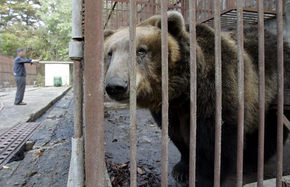 |
Gov’t plan to spur bear breeding draws ire from breeders, animal rights groups alike
At a bear farm on the outskirts of Chungju, North Chungcheong Province, 80 bears are confined to small cages. In each cage, one or two Manchurian black bears, each weighing about 100 kg, spend their days. At this bear-breeding farm, owned by a 52-year-old only identified as Cho, the bears will never know what it means to live in the wild.
South Korea has a total of 91 such bear-breeding farms. According to the Ministry of Environment, a total of 1,423 bears, including 1,296 Manchurian black bears, are currently held at such farms. In 1981, the government imported and distributed bears to farmers, aimed at helping farmers find a new source of revenue. However, breeders are banned from killing bears younger than 10 years old, as the government classifies bears born domestically as wild animals.
Breeders have demanded the government classify the bears as a livestock, such as deer and ostriches, so that they can slaughter them regardless of age. "Bears are fully adult in four years. After that, I have to raise them six more years, with feeding costs as much as 800,000 won (US$825) a year," Cho said. The demand for bear’s paws and gall bladders, used in traditional medicine, is also falling, another blow to Cho’s profitability, he said.
Environmental and animal rights groups held a campaign on November 3 in Seoul calling for the government to abolish its bear-breeding policy. "South Korea and China are the only nations that allow bear-breeding for extracting gall bladders," said Choi Eun-ae, an official of the Green Korea United, an environmental group. "One answer to the problem would be the government buying bears from breeders" and helping to raise them humanely, said Kim Hye-ae, the group’s another official, as the program to spur bear breeding was originally conceived by the government.
Some of the breeders also demand the government buy their bears. However, the government is reluctant to do so. Hong Jeong-gi, an official at the environment ministry, said, "Would taxpayers understand it if the government plans to spend tens of billions of their money in taking care of bears for 20 to 30 years and then letting them die?"





